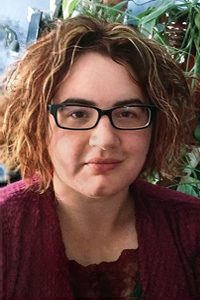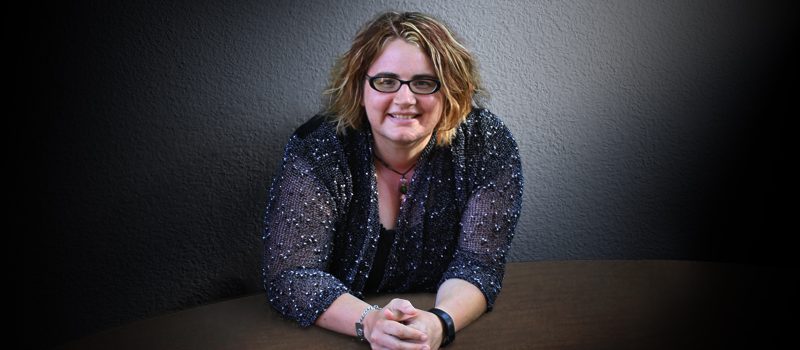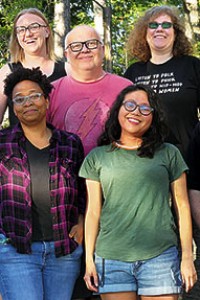Kameron Hurley: Why Does Writing Books Get Tougher Instead of Easier?
 One of the ironies of the writing craft is that the more novels many of us write, the more difficult it is to write a novel. This appears to be a contradiction, but I hear it again and again from other professional writers, and I encounter it in my own work. It’s as if, once you know how to write a book, it gets easier to see the flaws in subsequent manuscripts. Every time I open a new manuscript now, I stare at it wondering what kind of sorcery happened to create the last one, because surely this is an impossible task ahead.
One of the ironies of the writing craft is that the more novels many of us write, the more difficult it is to write a novel. This appears to be a contradiction, but I hear it again and again from other professional writers, and I encounter it in my own work. It’s as if, once you know how to write a book, it gets easier to see the flaws in subsequent manuscripts. Every time I open a new manuscript now, I stare at it wondering what kind of sorcery happened to create the last one, because surely this is an impossible task ahead.
There was a time when I could burn through a writing session on full steam without pausing to review. I’d just throw weird stuff in and keep going, figuring I could edit my way out later. But as my novels have matured in structure, I can’t get away with that as much as I used to. Oh, how I yearn for the classic quest plot, as any old thing can happen in those, as long as you feel there’s a sense of progression toward the ultimate goal of obtaining Magic Elixir #6. I still use classic quest plots in many of my short stories and in a few fantasy novel projects I have waiting in the wings, but I have enjoyed tackling more complex novel structures. Epics, thrillers, mysteries, and time-travel novels all require me to challenge myself in new ways.
Unlike tying your shoes or brushing your teeth, there are infinite ways to make one’s writing stronger and more compelling. I liken the leveling up of writing skill as on par with leveling up as a performer or athlete at a world-class level. Once you have the basics down, you can continue to work at the local level, but if you want to get better, to break out, to improve, to grow your audience, you must invest in making incremental progress.
The more experience I have writing novels, the easier it is for me to identify when something is “off” or simply not working. In the past, I either didn’t have the ability to see these issues or I could see them but couldn’t figure out how to correct them. Understanding that a novel has issues but knowing it has to ship anyway is tough. But if I hold onto a manuscript for too long, I will never attempt new projects. I will never give myself the space to try again.
This intuition about our work can be likened to leveling up in our ability to identify patterns. The more experience I have of the world, the easier it is for me to see red flags with people, publishers, projects, day jobs. It’s easier to spot emotional vampires. I’m better at figuring out which small publishers just want to be big, important fish in our small pond, paying attention to parties over profits. I’ve gotten far better at seeing through the misdirection of flattery to the cold, hard realities of an actual offer and contract. Wisdom and intuition come from experiencing what the world has to offer. It makes it easier for us to navigate the murky waters of life. It’s both a gift and an active skill that we can develop.
I have now written eight novels, two short fiction collections, and an essay collection, and I can confirm the process of creating something from nothing does not get any easier. But it does get better. Each attempt brings with it more experience, which in turn develops my ability to see narrative patterns and character development issues before I get too far into the weeds.
When I open a blank manuscript I’m more aware of how difficult it will be to create a wholly new world populated by wholly new people, but also have the confidence that this is something that can be done successfully. Eventually. I’ve done it before.
Instead of diving in headfirst into my drafting process, I’m spending more time examining structure, especially as it relates to drawing readers through a piece of work. It’s easier for me to see where the trail of breadcrumbs needs to be laid, and easier for me to pause and stop when I know I’ve gotten it all wrong. It means I’m not writing as quickly as I once was, but when I fold it all together, it’s a far more cohesive first draft than those I winged my way through in the past. This can cut down significantly on the time I spend in revisions. I experienced this while editing my military science fiction novel, The Light Brigade, which mostly required editing at the sentence level as opposed to the longer, more painstaking structural level.
This incremental, exhausting process of leveling up when reaching mid-career can be demoralizing. After attending the Clarion West writing workshop, I felt that I had leveled up two years in my craft in just six weeks. Today, I feel great pride if I can level up an aspect of my craft after two years of slogging through a novel and two short story collections. It’s a difficult stage to be at in one’s career because, for very long periods, you don’t feel any sense of progression at all. Instead, you experience long slogs through a swamp followed by sudden breakthroughs.
I often read Seth Godin’s short book, The Dip, whenever I feel like I want to quit writing books. Over the years, I’ve had three serious low periods where I considered quitting. His book reminds me that once we achieve a certain level of proficiency in any profession or task, it gets phenomenally more difficult to achieve smaller and smaller gains. But it is these small, incremental gains that separate those performing at a professional level and those performing at a world-class level. And make no mistake: my goal is to become an exceptional writer. I want to perform at a very high level; I don’t just want to be “good enough.” I have been “good enough” for some time. If I want to continue in this career, I need to have a bolder goal. And having big goals makes everything tougher.
Holding oneself to a high standard makes each subsequent book more difficult. Writing different types of books instead of the same basic story again and again will also make writing more challenging. I still find myself dipping into those old quest plots when I’m writing short fiction. And while I take great pleasure in writing many of those stories, I find that they don’t press me to challenge myself in any new or interesting way. They are a fun exercise, but not part of the leveling up process, for me.
Writing books gets tougher because we become better at it. There’s some comfort in that. Whenever I despair, I remind myself that it’s tougher because I’m a more capable writer. I understand that creative pursuits exist on a cycle of stagnation and breakthroughs. To stay in this business requires me to level up my craft and reinvent myself every few years because, let me tell you – the level of craft and creativity in this genre continues to become higher. To stay in the game, I need to level up.
I only fail when I stand still.
Kameron Hurley is the author of The Stars are Legion and the award-winning essay collection The Geek Feminist Revolution, as well as the God’s War Trilogy and The Worldbreaker Saga. Hurley has won the Hugo Award, Kitschy Award, Locus Award, BFA Award, and Sydney J. Bounds Award for Best Newcomer. She was also a finalist for the Arthur C. Clarke Award, the Nebula Award, and the Gemmell Morningstar Award. Her short fiction has appeared in Popular Science Magazine, Lightspeed Magazine, and many anthologies. Hurley has also written for The Atlantic, Bitch Magazine, The Village Voice, and Entertainment Weekly. She posts regularly at KameronHurley.com.
All opinions expressed by commentators are solely their own and do not reflect the opinions of Locus.
This article and more like it in the October 2019 issue of Locus.
 While you are here, please take a moment to support Locus with a one-time or recurring donation. We rely on reader donations to keep the magazine and site going, and would like to keep the site paywall free, but WE NEED YOUR FINANCIAL SUPPORT to continue quality coverage of the science fiction and fantasy field.
While you are here, please take a moment to support Locus with a one-time or recurring donation. We rely on reader donations to keep the magazine and site going, and would like to keep the site paywall free, but WE NEED YOUR FINANCIAL SUPPORT to continue quality coverage of the science fiction and fantasy field.









I love this! I’m not at your level yet, but I feel this.
At my day-job, I’m a software engineer, and I’ve noticed, especially in SFF, I’m not the only writer/coder out there. Since I see my computer science degree as a degree in pattern recognition, it makes perfect sense to me why so many of us want to do both.
Similar, Morgan.
For me I think the appeal of building a world and creating characters scratches a similar itch to creating something that functions independently of you, often achieving things you yourself couldn’t.
Though for me I’m not certain yet that each new book is harder – I’m still telling myself it’s just I’m learning new kinds of things and discovering new types of problems with each book.